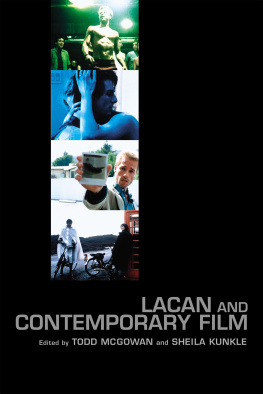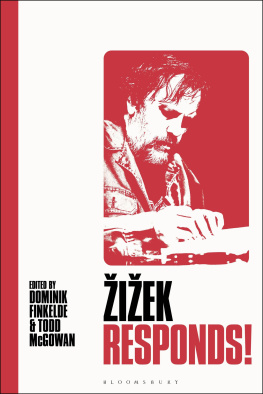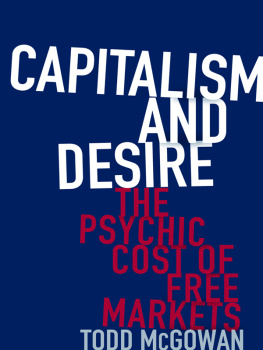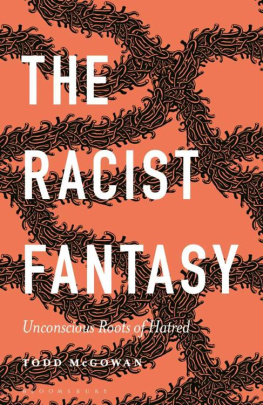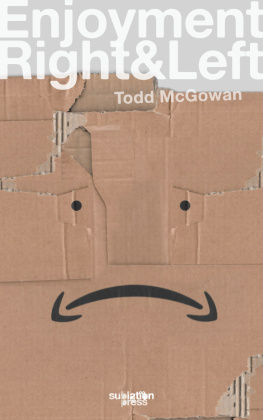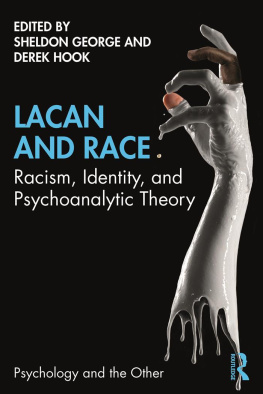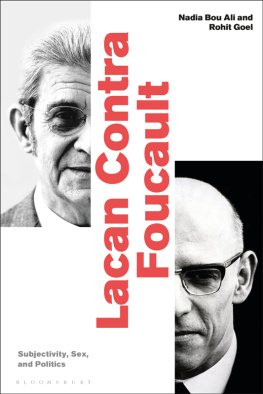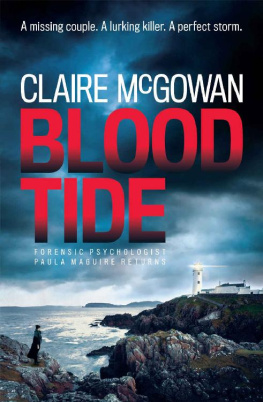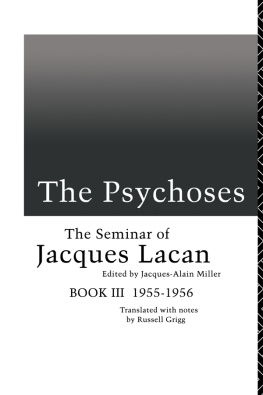Todd McGowan - Lacan and Contemporary Film
Here you can read online Todd McGowan - Lacan and Contemporary Film full text of the book (entire story) in english for free. Download pdf and epub, get meaning, cover and reviews about this ebook. year: 2020, publisher: Other Press, genre: Religion. Description of the work, (preface) as well as reviews are available. Best literature library LitArk.com created for fans of good reading and offers a wide selection of genres:
Romance novel
Science fiction
Adventure
Detective
Science
History
Home and family
Prose
Art
Politics
Computer
Non-fiction
Religion
Business
Children
Humor
Choose a favorite category and find really read worthwhile books. Enjoy immersion in the world of imagination, feel the emotions of the characters or learn something new for yourself, make an fascinating discovery.
- Book:Lacan and Contemporary Film
- Author:
- Publisher:Other Press
- Genre:
- Year:2020
- Rating:5 / 5
- Favourites:Add to favourites
- Your mark:
- 100
- 1
- 2
- 3
- 4
- 5
Lacan and Contemporary Film: summary, description and annotation
We offer to read an annotation, description, summary or preface (depends on what the author of the book "Lacan and Contemporary Film" wrote himself). If you haven't found the necessary information about the book — write in the comments, we will try to find it.
Lacan and Contemporary Film — read online for free the complete book (whole text) full work
Below is the text of the book, divided by pages. System saving the place of the last page read, allows you to conveniently read the book "Lacan and Contemporary Film" online for free, without having to search again every time where you left off. Put a bookmark, and you can go to the page where you finished reading at any time.
Font size:
Interval:
Bookmark:
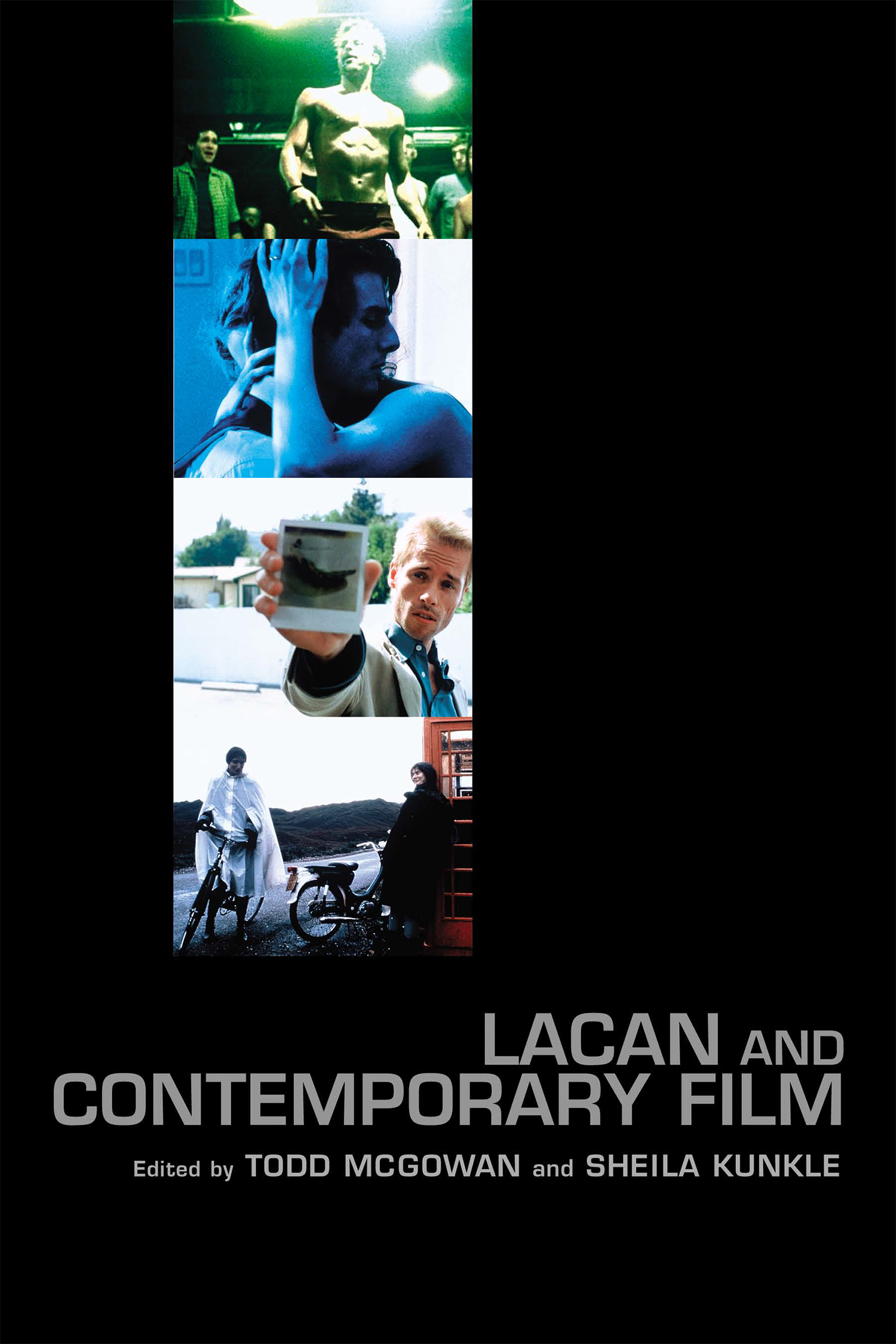
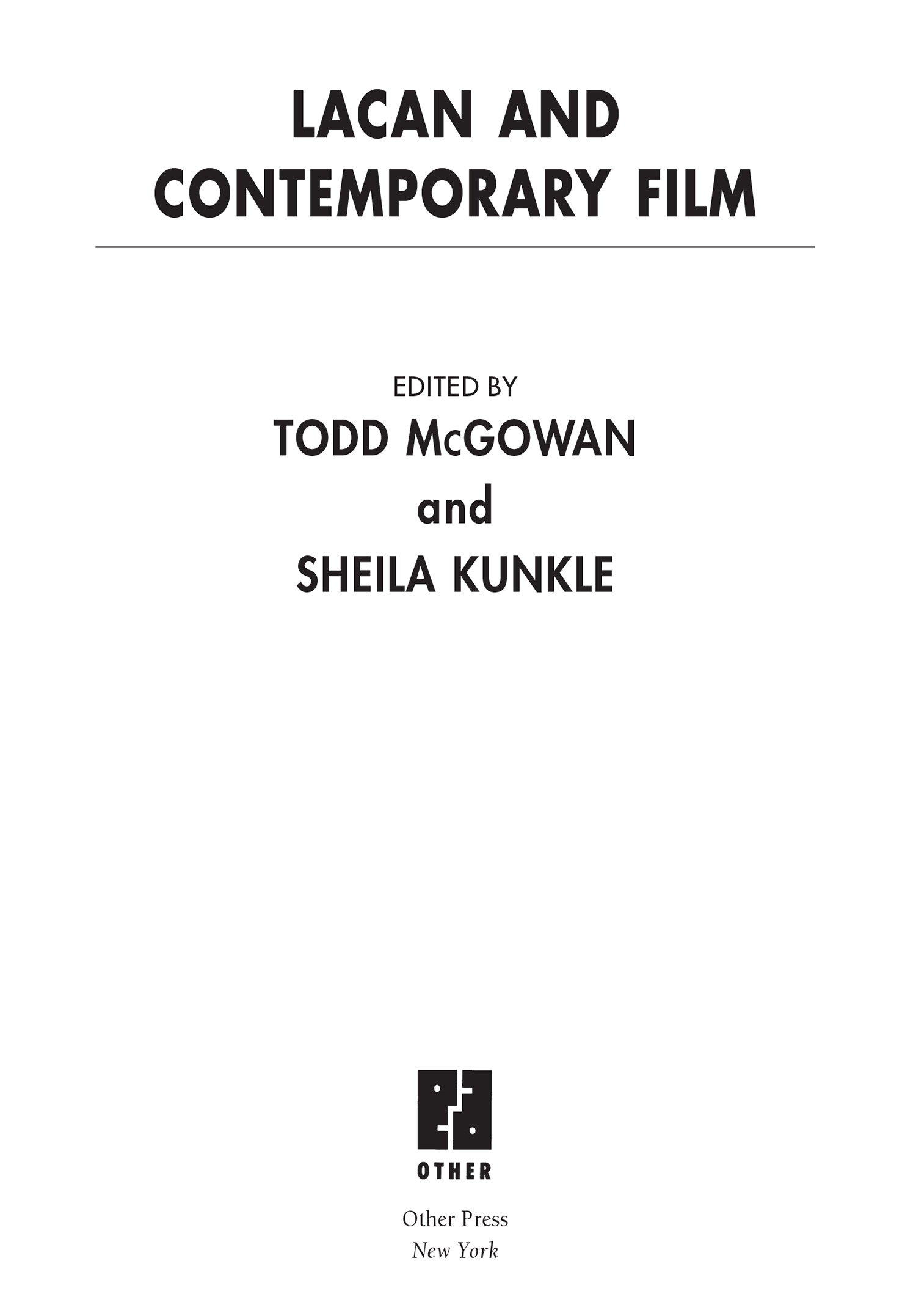
Copyright 2004 Todd McGowan and Sheila Kunkle
Production Editor: Robert D. Hack
Ebook ISBN9781635421064
All rights reserved. No part of this publication may be reproduced or transmitted in any form or by any means, electronic or mechanical, including photocopying, recording, or by any information storage and retrieval system, without written permission from Other Press LLC, except in the case of brief quotations in reviews for inclusion in a magazine, newspaper, or broadcast. For information write to Other Press LLC, 267 Fifth Avenue, 6th Floor, New York, NY 10016. Or visit our Web site: www.otherpress.com.
Library of Congress Cataloging-in-Publication Data
McGowan, Todd.
Lacan and contemporary film / by Todd McGowan & Sheila Kunkle.
p. cm.
Includes bibliographical references and index.
ISBN9781590510841 (pbk : alk. paper)
1. Motion picturesPsychological aspects.2. Psychoanalysis and motion pictures.3. Lacan, Jacques, 1901I. Kunkle, Sheila.II. Title.
PN1995 .M379 2004
791.43019dc22 2003020952
a_prh_5.5.0_c0_r0
C ONTEMPORARY T HEORY S ERIES
Series Editor: Frances Restuccia, Professor of English, Boston College
Gender in Psychoanalytic Space:
Between Clinic and Culture
Muriel Dimen and Virginia Goldner, eds.
Topologies of Trauma:
Essays on the Limit of Knowledge and Memory
Linda Belau and Petar Ramadanovic, eds.
Re-inventing the Symptom:
Essays on the Final Lacan
Luke Thurston, ed.
Art: Sublimation or Symptom
Parveen Adams, ed.
Lacan and Contemporary Film
Todd McGowan and Sheila Kunkle, eds.
TODD MCGOWAN and SHEILA KUNKLE
L acan has long been a name associated with the analysis of film. During the 1960s and 1970swhat was perhaps the most fecund epoch of theorizing about filmhe served as an inspiration for nearly every significant contribution to the development of film theory. Before Lacan became a popular figure in the rest of the humanities, he was firmly ensconced in a foundational role within film studies. Christian Metzs The Imaginary Signifier, Laura Mulveys Visual Pleasure and Narrative Cinema, and Jean-Louis Baudrys Basic Effects of the Cinematographic Apparatus, just to name a few of the major works of the time, all took Lacanian psychoanalysis as their starting point for apprehending the cinematic experience theoretically. Lacanor at least a certain understanding of Lacanprovided film studies with a way of making sense of films appeal. Specifically, Lacans insights into the process of identification allowed film theorists to see why film was so effective in involving spectators in its narrative. As a result, Lacanian psychoanalysis became the approach within film studies.
In fact, Lacan dominated film studies so thoroughly that Lacanian psychoanalysis dictated the very terms of debate within the field. Theoretical innovations, when they occurred, arose as counterpoints to a Lacanian understanding. We can see this when, for instance, Gaylyn Studlar couched her unique insight into the role of masochism in filmic pleasure as an alternative to the prevailing Lacanian conception of identification. Even more significantly, however, David Bordwell and Nol Carroll introduced their Post-Theory collectionan attempt to turn film studies in the direction of cognitive theory and empiricismas a riposte to Lacanian film theory, what they labeled the Theory. Despite their open hostility to what they believed were the nefarious effects of Lacan on film studies, Bordwell and Carroll nonetheless conceived their collection as a corrective to these effects, thereby attesting to Lacans hegemony. Thus, throughout the last twenty-five years, both partisans and opponents have demonstrated Lacans importance.
This importance has not been without its negative ramifications, however. Though Lacanian theory set the terms of debate within film studies, it did so very narrowly, and this narrowness eventually resulted in its evanescence. At an increasing rate over the last ten years, Lacanian psychoanalysis has disappeared from film studies, the discipline that it once thoroughly controlled. This collection of essays emerges in the midst of this evanescence, out of an effort to rethink the relationship between Lacanian psychoanalysis and film theory, especially in light of recent developments within film itself. That is, the contributors seek to conceive a Lacanian analysis of film that is adequate to the exigencies of contemporary film, and this requires a break from the previous incarnation of Lacanian film theory. They are attempting to bring Lacan to the study of film with an entirely new emphasis. However, the understanding of Lacanian theory developed in the essays that follow can best be understood by distinguishing it from the Lacanian film theory it aims to replace. In other words, in order to see the direction in which these essays will take Lacanian theory, we must pay attention to the limitations that have plagued Lacanian film theory in the past. The narrowness of Lacanian film theory manifested itself chiefly in two ways: in the way that film theory appropriated Lacanian psychoanalysis and in the way that film theory approached cinematic experience. Let us look at each of these in detail.
Film theorys understanding of Lacan was largely mistaken. It had the effect of placing an undue importance on the role of the mirror stageand the category of the imaginaryin Lacanian theory. This misplaced emphasis began with Christian Metz and Jean-Louis Baudry, who likened the cinematic experience to that of Lacans mirror stage, in which the subject believes itself to attain a mastery of the self and of the visual field that it does not actually have (see Lacan 2002). When it came to Lacan, film theory dealt with the registers of the imaginary (the order of the image) and the symbolic (the order of language), focusing on the interrelations of these registers to the near-total exclusion of the Real (that which resists symbolization absolutely). According to a theorist such as Metz, the reception of film was an imaginary experience that had the effect of blinding the subject to its interpellation into the symbolic order. By providing subjects with an illusory mastery over the visual field, cinema disguises their subjection to the signifier. As Joan Copjec (1994) points out in Read My Desire, this formulation followed directly from Louis Althussers attempt to allow Lacan to inform a Marxist understanding of the process of ideological interpellation.
According to this view, film became an ideological weapon and Hollywood a factory for the interpellation of subjects into ideology. As Jean-Louis Baudry puts it,
[cinema] constitutes the subject by the illusory delimitation of a central locationwhether this be that of a God or of any other substitute. It is an apparatus destined to obtain a precise ideological effect, necessary to the dominant ideology: creating a fantasmatization of the subject, it collaborates with a marked efficacy in the maintenance of idealism. [1985, p. 540]
Here, the filmic experience creates a sense of subjectivity in the spectator at the point that this spectator is most thoroughly deprived of subjectivity. Films imaginary reinforcement of an illusory subjectivity fulfills a crucial role in the working of ideology, which has as its fundamental aim the production of a sense of subjectivity. As Louis Althusser formulates it in his landmark essay Ideology and Ideological State Apparatuses, all
Font size:
Interval:
Bookmark:
Similar books «Lacan and Contemporary Film»
Look at similar books to Lacan and Contemporary Film. We have selected literature similar in name and meaning in the hope of providing readers with more options to find new, interesting, not yet read works.
Discussion, reviews of the book Lacan and Contemporary Film and just readers' own opinions. Leave your comments, write what you think about the work, its meaning or the main characters. Specify what exactly you liked and what you didn't like, and why you think so.

